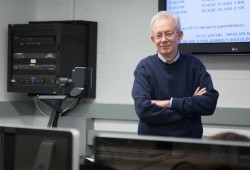
From typewriters and vinyl records to live broadcasting and automation, John Lytle, the Ellis and Nelle Levitt Distinguished Professor of Journalism, has seen it all. This spring, after nearly 40 years of teaching, Drake will say goodbye to this esteemed professor at a retirement reception on Saturday, April 26.
Lytle came to Drake University in 1977 when the broadcast news program was first expanding, and he never left, saying the exemplary leadership and supportive colleagues have made Drake a great place to work.
“When you work at Drake, you have the ability to shape your courses,” says Lytle. “As a faculty, we’re constantly thinking about how to improve the curriculum and deliver the best product.”
Lytle has experienced first hand the dramatic shifts in broadcast journalism over the past 40 years. Both current and former students praise him for his guidance and mentorship, which has helped them prepare for today’s digital age.
“I recall knowing back when I was a freshman that our industry was changing and becoming more and more technologically advanced,” says Adam Ghassemi, JO’04, who now works as a reporter-anchor for News Channel 5 in Nashville. “With Lytle’s guidance, I decided to earn dual degrees in broadcast news and information systems. At the time, SJMC and the College of Business and Public Administration were not collaborating on degrees as often as they do today, and Lytle was key in helping me see the benefit of a dual degree.”
Lytle says the highlight of his career has been seeing his students succeed, and many broadcast graduates say they’ve been able to achieve their dreams because of Lytle.
“What would Lytle do?” has become a slogan for SJMC students, and the phrase will be printed on wristbands, which will be available at his retirement reception on April 26.
John Lytle’s Retirement Reception
Saturday, April 26
4–6 p.m.
Meredith Hall
“He expects the best from his students and provides the tools and the motivation to be the best broadcaster you can be,” says Amanda Horvath, a junior studying broadcast journalism. “He is the type of professor and adviser that gives you simple starting points to use and then makes you jump in the deep end and learn how to swim. Whenever I am out on a story assignment and don’t know what to do, I think to myself, what would Lytle do?”
John Garcia, JO’86, a reporter for ABC 7 News in Chicago, also uses that phrase to guide his decisions.
“I have often spoken of how important Lytle’s influence has been to my career. I still find myself asking, ‘what would Lytle do’ when confronted with ethical questions in journalism,” says Garcia. “In an era when ethics in journalism often take a back seat, I have always found the right, ethical direction when I try to imagine what Lytle would do.”
Aside from ethical decision-making, Lytle hopes he has instilled the importance of a strong work ethic in all of his students.
“With some hard work, perseverance, and goals, you can accomplish darn near anything,” says Lytle. “It takes a little luck, some contact, and a little background, but you have to want to do it; you have to have the fire.”

